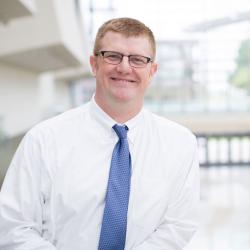Hard as it is for me to believe, we are quickly approaching the first anniversary of my father’s death. He had struggled with kidney cancer for a number of years, and had in fact lived a relatively healthy and active life well beyond medical expectations. But as time went on, the disease gradually took its toll, and in September of 2004, my father passed away.
I remember very clearly the day of his final trip home from the hospital, after it had been determined that the pursuit of additional lifesaving measures would be futile. Throughout that first night, my wife and I sat with my father as he lay on a hospital bed in the family room of the home that he and my mother had built when their family was young. He had lived the majority of his adult life and raised his children in that home, and now he would live out his final days there as well. Every few hours, I would inject a dose of pain medication into a port that had been placed in his abdomen. Though at that point he was still occasionally lucid, I did have to convince him to stay in bed a few times, as he had somehow made himself believe that it was time for him to get up and go to work.
I remember even more clearly his last words to me, on the morning of September 10th. At the end of a visit with my wife and three month old son, I turned to him and said “I love you, dad.” He squeezed my hand and responded – “I love you too, Marc.” If there is a better phrase that a son could hear as his father’s last words to him, I don’t know what it is.
10 days later, he was gone.
We hear a lot in our society about the importance of “death with dignity.” Often this phrase is used in the promotion of physician-assisted suicide by people who argue that those with terminal illnesses should have the right to “hasten their death” in the face of suffering. In so arguing, however, advocates of assisted suicide reinforce the idea that those who suffer have no intrinsic value as human beings that would cause society to favor sustaining their life; and as a result they strip those who suffer of any dignity at all. They seem to say that the terminally sick and aged have no inherent dignity – but it can be earned by choosing suicide.
The assisted suicide movement – like so many well-meaning “compassionate” efforts – fails because it does not recognize the inherent worth of every man, woman, and child. Dignity and value are not commodities that rise and fall on some moral market in response to the fluctuations of human frailty. They are intrinsic to what we are as humans. They are a part of our very nature, as real a part of us as the blood that flows in our veins.
These thoughts come to mind as I read of the passing of Dame Cecily Saunders, the founder of the modern Hospice movement. Her life’s work has allowed countless individuals to face the end of their life with some amount of physical comfort, often in their own home surrounded by their loved ones. There is a profound truth at the core of the movement that she founded: that dignity in death comes not through the act of dying, but through the act of living one’s life to the fullest until death.
My family’s experience with Hospice is just one of many stories that could be told. In fact, the genesis of this post came as I read this remembrance, which touched me deeply because it is so familiar to me:
Dad fought the good fight against colon cancer for about two years until the day he was sitting on a hospital bed contemplating a bile drainage bag doctors inserted to prevent jaundice caused by tumor blocking his bile duct. Dad looked at the bag taped to his inner thigh. He sighed deeply and his shoulders sagged and he looked up at me with an expression I had never seen before. That was it, I knew. Dad had made a momentous decision: his fight to stay alive was over.
As a society, we too often make dying a shameful thing, something unnatural to be hidden away in a dark corner. Mom and I were determined that wouldn’t happen to Dad, that just because he was dying that did not mean his life was over. We shifted emphasis from cure and life prolongation, to comfort, dignity, and peace. That meant hospice, which then was still a relatively novel concept.
Dad benefited tremendously from hospice care. His last several months were peaceful, pain-free, and nurtured. He was cared for deeply by my mother and by dedicated hospice professionals. He would spend hours sitting on a bench in his back yard overlooking his beloved cactus garden, contemplating his life and the ultimate issues raised by human mortality. As an only child, I carried a heavy burden, not only in caring for my father, but also my mother, who was devastated by the depth of her pending loss. Hospice provided me with grief counseling–before Dad died–an invaluable aid in helping me help my folks. Dad died in a veteran’s hospital hospice unit in Los Angeles, and with his passing he gave me an invaluable gift: my father taught me how to die with dignity, courage, and fortitude.
St. Francis said that “it is in dying that we are born to eternal life.” We should all be thankful for the work of Dame Cecily, who – taking his words to heart – did so much to comfort and console not only the dying, but those of us who are left behind.

